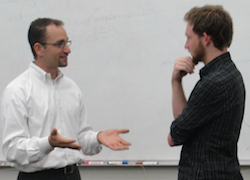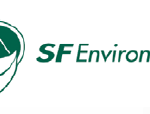Sustainovation: Earth Day Meets Digital Innovation
by guest writer Dr. Kevin Danaher, San Francisco Department of the Environment
Despite the bad news about the environment— depletion of clean air, water and soil, extreme weather events that damage infrastructure and kill people, the melting of glaciers and polar ice caps, rising oceans levels—we are seeing an encouraging cross-fertilization between the green economy and the digital economy.
We are witnessing the birth of a new economic model—a triple-bottom-line model that puts social equity and environmental restoration on an equal footing with financial sustainability (profit). That economic model will steadily replace the old profit-centric model as the impacts of environmental destruction and inequality get impossible to ignore.
The new economic model sees sharing as the new buying, and Bay Area companies are leading the way. AirBnB allows people to share living space. GetAround allows people to share their motor vehicles. LiquidSpace allows people to share workspace. Everywhere you look, people are coming together to strengthen the local, resource-sharing economy.
This new economic model undermines the old myth that saving the environment will destroy jobs and slow economic growth. The data are showing us that the triple-bottom-line enterprise model—making money by saving resources rather than destroying them—creates more and better jobs than the old model.
A study by the Pew Charitable Trust found that green jobs in the U.S. grew more than twice as fast as the overall job market between 1998 and 2008, and suffered fewer setbacks. The private sector has invested over $2.4 trillion in green companies and technologies since 2007, and the projection is for future investments of $1 trillion annually – an amount necessary to accelerate a global transition to sustainability.
For three years San Francisco has enjoyed 40 percent of the Bay Area’s job listings at “high growth” startup companies. Last year the 415 area code pulled in $3 billion in new venture capital.
There is a straightforward supply-and-demand driver of these trends. As the natural resource base gets destroyed, it becomes more profitable to conserve resources and develop efficient alternatives. A business that finds ways to make more profit healing nature than destroying it is bound to be successful.
There are buildings in San Francisco that are saving tens of thousands of dollars per year in operating costs due to changes promoted by the SF Department of Environment. We are proving that sustainability can be profitable.
And we Americans have a special responsibility to promote matriotism (love of Mother Earth), because we are less than 5 percent of the world’s population but we use 25 percent of the world’s resources and we produce more than 25 percent of the world’s pollution.
Matriotism involves creating a “solutionary” culture where people feel empowered to change the things in their neighborhood that need upgrading (planting more trees, promoting community farming, increasing the rate of composting and recycling). It means creating a culture of “sustainovation”: innovation that promotes sustainability.
Matriotism also requires that we learn how to become good ancestors. The masons who built the foundation layers of the cathedrals in Europe that took centuries to build knew that they would not see the final product of their work. But they also knew that they had to do very solid, precise work because of all the weight that would eventually rest on the foundations they were putting in place.
We are the modern equivalent of those masons. We are laying the foundations of a future sustainable global economy that will have no starving children, no clear-cut forests, no wars for oil, and no endangered species. The only questions revolve around how long that will take and how we will muster the courage to save humanity from itself.
And we already have a prime directive to guide us on this challenging journey, from the green architect, William McDonough: “How do we love all the children, of all species, for all time?”

Get your signed copy of
Build a Green Small Business (McGraw-Hill)!
Or...talk with the author!
Click here to schedule an hour consultation.
 Green franchise opportunities:
Other green business ideas
Green franchise opportunities:
Other green business ideas
- Healthy Fast Food
- Farmer's Market
- Personal Trainer & Diet Planner
- Juice Bar and Smoothie Café
- Green Building Materials Store
- Permaculture and Urban Farming
- Edible and Organic Floristry
- Energy Efficiency Auditing
- Ecotourism and Sustainable Travel Planner
- Sustainable Coffee House
- Consignment Shop for Kids Clothing & Toys
- Natural Foods Co-op
- Sustainable Food Prep and Cooking Instruction
- Food Plant Nursery
- Mesh Network Telephone and Internet Company
- Drive-thru Coffee Stand & Espresso Shop
- Eco-Friendly House Cleaning Service
- Organic Backyard Garden Landscape Design
- Green Bed and Breakfast (B&B)
- Sustainable Mobile Food Vendor
- Biodiesel Cooperative
- Eco Friendly Pool and Spa Cleaning
- Green Wedding and Sustainable Event Planner
- Organic Farm
- Gift Basket Service
- Pedicab Company
- Used Books Vending Machines
- Organic Day Spa
- Restaurant Food Delivery Service
- Used Bicycle Retailer
- Landscape Maintenance in Arid climates
- Organic Food Delivery Service
- Outdoor Gear Consignment Shop
- Eco Concierge Service and Relocation Specialist
- Organic Community Supported Agriculture
- Sustainable Property Management
- Residential Solar




